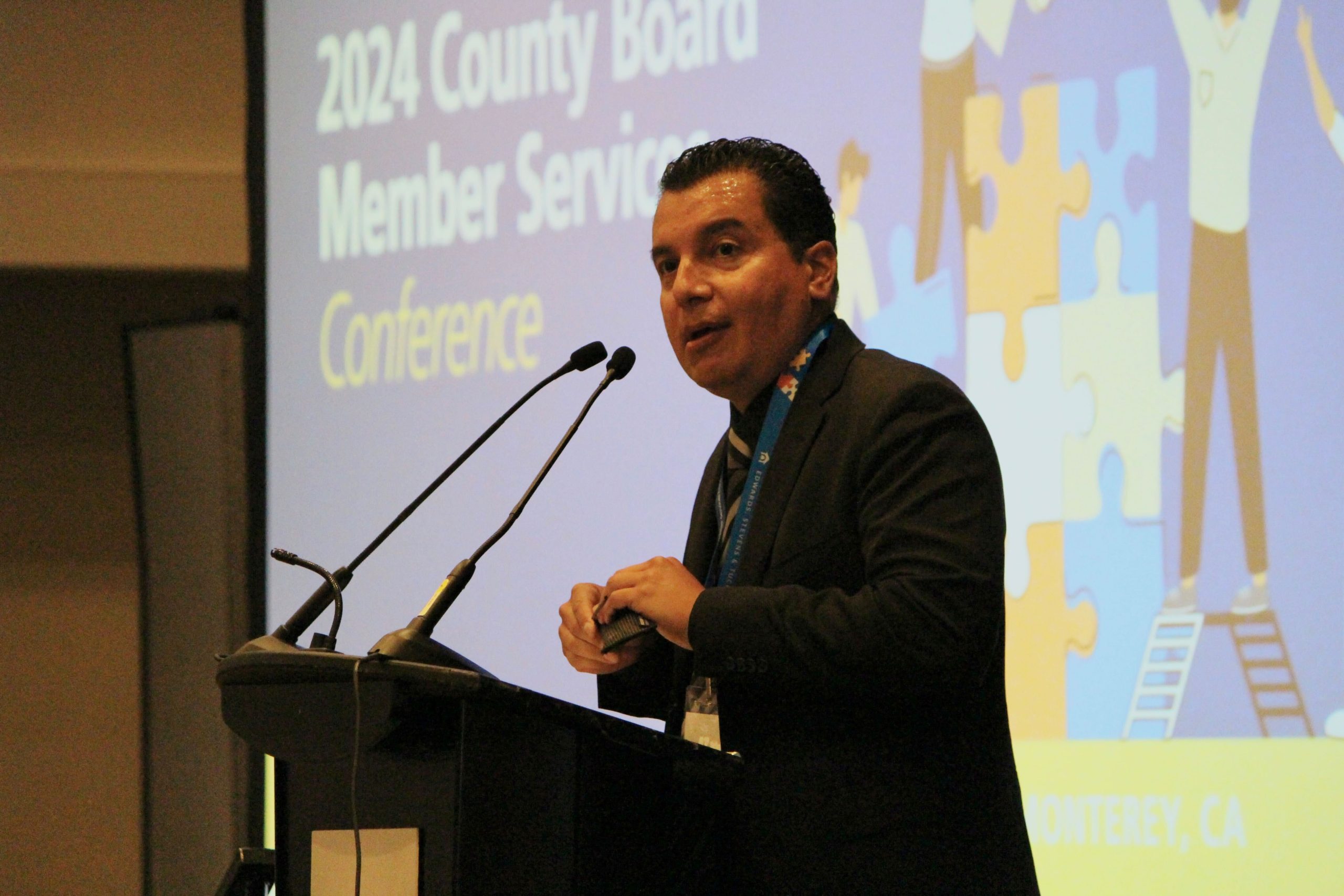The annual convening of county board members from across the state at the CSBA County Board Member Services Conference revisited valued traditions of previous years and added new twists, like the preconference sessions, Key Elements of the Brown Act and California School Board Ethics trainings.
Another preconference opportunity saw CSBA Governmental Relations Chief Patrick O’Donnell, Legislative Director Chris Reefe and External Affairs Director Raquel Maden share with attendees the intricacies of effective political advocacy during the Advanced Advocacy and Legislative Leadership Seminar.
This provided a perfect segue into the first General Session, Pure Politics, which featured a panel of leaders from longtime CSBA partner Capitol Advisors Group chronicling the most significant developments from the last year of education politics.
Circling back to the importance of collective, consistent advocacy, Capitol Advisors President and founding partner Kevin Gordon noted CSBA’s leadership in fighting to maintain the integrity of Proposition 98 in the latest state budget.
“We have a huge debt of gratitude in the entire education community to the gutsiness of CSBA because they got way out on a limb on this issue. We were put in this position of, if you don’t fight for this in terms of the constitutional provisions that exist there, you will undermine Prop 98 in perpetuity,” Gordon said. “CSBA had the guts to get out there and point it out. And then we worked really hard with the California Teachers Association, the Association of California School Administrators and the California Association of School Business Officials to help them understand what was at stake. And people slowly came together, but you guys deserve a lot of credit for really leading that. It’s just the most stunning sort of budgetary success I’ve seen in my entire career.”
The panel closed with a preview of issues the public education system will face in coming years, as well as areas in which local educational agency advocacy will be critical, in areas related to declining enrollment, attendance and the increasing cost of settling cases of childhood sexual abuse as a result of recent legislation.
CSBA CEO & Executive Director Vernon M. Billy introduced longtime Butte County school board member and former CSBA President Mike Walsh in his new capacity as the first CSBA Director of County Board Member Services. Walsh was selected for this new, higher-level staff position tasked with programming and day-to-day support of county members because “the continued growth of County Board Member Services requires an experienced hand with intimate knowledge of the county landscape,” Billy said.
That landscape was covered in detail throughout the conference in a variety of sessions focused on five main concepts: advocacy and community engagement; the legal duties of county boards; funding, finance and human capital; shared governance; and wellness, safety and learning. Topics included charter authorization and renewal, the use of CSBA sample policies, assessing interdistrict attendance appeals, elevating community schools, budget approval, accessing governance resources from CSBA, social and emotional learning, literacy, educational innovations, STEAM, setting the superintendent’s salary, Title IX, education workforce housing, mental health, and cross-agency collaboration to create pathways to success for youth.
Davis Campbell, a former CSBA executive director and current chair of the Dean’s Board of Advisors for the UC Davis School of Education, led the second General Session, which focused on the plethora of qualities that high-functioning governance teams possess and provided insight into how trustees could work together to better lead their LEA.
He laid out the three pillars of effective governance and four elements of a governance mindset — all covered extensively in the book “The Governance Core: School Boards, Superintendents, and Schools Working Together,” of which Cambell is an author.
“I believe very deeply that the key to high-quality education is to have a high-quality governance system,” he told an audience of about 150 county trustees. “And when governance isn’t working, in most cases, nothing else is working because the impact of governance is so profound, and it affects all aspects of the school district and a county board.”
Additional information on this topic can be found in the summer 2024 issue of California Schools feature, “United we stand: Building a high-functioning governance team.”
The closing General Session provided an impactful panel discussion, From Awareness to Action: Tackling Human Trafficking Together, which was led by the Monterey County Board of Education and featured Ashley Chesney, an author, advocate and survivor.
“Adverse childhood experiences are all things that can make a person vulnerable to trafficking. Vulnerability is the number one way that traffickers seek victims,” Chesney said in a video shown during the presentation. “Trafficking is not always about abductions and kidnapping. It can be the gradual expansion of boundaries and increase in trust.”
Monterey COE leaders discussed their annual symposium on human trafficking, including partnerships, topics covered in recent years, professional development opportunities, curriculum within the state health education framework and more.
“We as a county office and our county board of education feel that we have certain responsibilities to the communities that we serve,” said Superintendent Deneen Guss. “We also feel like policy development is critical in ensuring that all of the school districts in our county have the policies in place to protect their young people and to keep them safe.”
The conference concluded with a presentation and feedback on the preliminary recommendations from the Transitional Working Group on the future of CSBA County Board Member Services. The recommendations will be presented to the CSBA Board of Directors at their December meeting.





